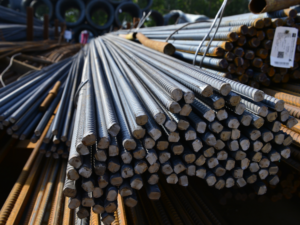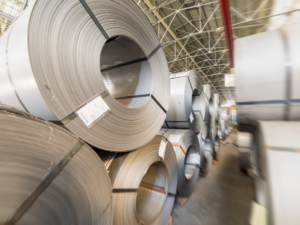The Russia-Ukraine conflict has already distorted iron ore and steel supply chains because of both countries’ heavy involvement in these markets, Alexander Siryk, the CEO of MCI Metals Consulting International (Düsseldorf) said on a Feb. 24 webinar that the European steel distributors’ association Eurometal and the American Metals Supply Chain Institute organized.
Russia produces around 6.5 million mt/month of steel, while Ukraine produces 1.8 million mt/month, Siryk said. Both nations are also major exporters of semi-finished steel — slabs and billet. Slabs are supplied to Europe — which would be very exposed by any major disruption — and billets to the Middle East as well as Asia.
A shortage of billets could also lead to a shortage of scrap, he said.
Some of Russia’s iron ore shipments are shipped through Ukraine, where Odessa, in the Black Sea, is the only Capesize port, with shipments often destined for China, he noted.
The European market could feel any tightness in Ukrainian iron ore supplies resulting from the conflict, Siryk said.
Alexander Julius, a member of Eurometal’s presidency, said that markets for iron and steel products are likely to get tighter as a result of the conflict and the European Commission should take this into account when imposing sanctions.
“Ukraine is not in a position to supply and Russia will most likely not be permitted to supply and this will result in a lack of material in the countries of destination, affecting end-users and steel processors, and there needs to be a substitute to make material available,” he said.
S&P Global Platts assessed Commonwealth of Independent States export billet at $663.50/mt FOB Black Sea Feb. 24, down $1.50 from Feb. 23.
Due to market disruptions resulting from the escalation of the Russia-Ukraine conflict, no bids, offers, trades, or indicative market values for the Black Sea billet assessment were reported on the day.
The Black Sea flat steel market was already reported to have “frozen” Feb. 23, prior to Russia’s Feb. 24 invasion of Ukraine, with no price changes. Turkey’s long and flat steel markets were described as being in a wait-and-see mode Feb. 24 amid trade and currency uncertainties.
Platts assessed the 62% Fe Iron Ore Index at $136.95/dry mt CFR North China Feb. 24, down $1.10 from Feb. 23 on muted procurement activities.
International trade lawyer Lawrence Hanson said on the webinar that the Ukraine situation will heighten global trade tensions.
Speakers on the webinar noted that questions may be raised over the future of Russian steelmakers’ operations in the US and the EU with new sanctions. Russia’s Evraz and NLMK Group have production assets in the US and NLMK also has operations in the EU.
— Diana Kinch






